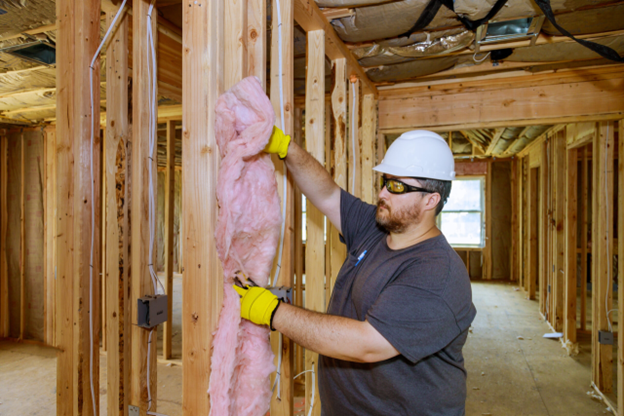Why Is My Insulation Not Reducing Noise

When it comes to soundproofing a room, insulation is often one of the first solutions that come to mind. However, it can be frustrating when you install insulation in your walls or ceilings and still find yourself getting disturbed by external noises. This begs the question: why is my insulation not reducing noise?
In this article, we will explore the possible reasons why your insulation may not be effectively reducing noise and provide tips on how to improve its soundproofing capabilities. We will also discuss the different types of insulation and their noise reduction properties, as well as other factors that may contribute to a noisy environment.
So, if you're struggling with unwanted sounds penetrating your home or workspace despite having insulation, keep reading to find out why and how you can solve this problem.
Types of Insulation
There are various types of insulation available in the market, each with its unique properties and benefits. Some common types include fiberglass batts, cellulose, spray foam, and mineral wool. Although all of them can provide thermal insulation to your home or building, they differ in their ability to reduce noise.
Fiberglass batts are the most commonly used type of insulation and provide a moderate level of soundproofing. Cellulose is made from recycled paper and has good noise-reduction capabilities due to its density. Spray foam insulation is known for its superior air-sealing abilities but also provides decent soundproofing.
Mineral wool, also known as rock wool, is the most effective type of insulation for noise reduction. It has a high density and can significantly reduce sound transmission through walls or floors.
Reasons Why Insulation May Not Reduce Noise
Although insulation can help reduce noise, it may not be as effective as you expect due to various reasons. Here are some possible explanations:
Insufficient Coverage
One of the main reasons why your insulation may not be reducing noise is because there is simply not enough of it. Insulation works best when there is a continuous layer covering all surfaces, including walls, floors, and ceilings. If there are any gaps or missing areas in your insulation coverage, sound can easily pass through those openings.
It's essential to ensure that you have the proper amount of insulation for your space and that it is evenly distributed throughout. You may need to add more layers or upgrade to a denser material if you find that your current insulation is not providing enough soundproofing.
Wrong Type of Insulation
As mentioned earlier, not all types of insulation are created equal when it comes to noise reduction. If you have chosen a type of insulation primarily for its thermal properties and overlooked its soundproofing capabilities, this could be why your insulation is not reducing noise effectively.
If you live in a noisy area or have specific noise concerns, it's crucial to choose an insulation material that has good sound-absorbing properties. Consider upgrading to a thicker or denser option such as mineral wool or adding additional layers of soundproofing materials if necessary.
Gaps and Air Leaks
Even if you have the right type and amount of insulation, it may not be effective if there are gaps or air leaks present. These openings can allow sound to travel through and negate the effects of insulation.
Make sure to seal any cracks or gaps in your walls, floors, and ceilings before installing insulation. This will not only improve its noise reduction capabilities but also help with energy efficiency.
Plus, regular maintenance and upkeep can prevent gaps from forming over time, ensuring your insulation continues to provide proper soundproofing.
Low Density of Insulation Material
The density of insulation material can greatly affect its ability to reduce noise. Lower-density materials such as fiberglass batts may not be as effective at absorbing sound compared to denser options like mineral wool.
If you find that your current insulation is not providing enough soundproofing, consider upgrading to a denser material or adding additional layers for better results. Additionally, make sure to check the noise reduction rating of your insulation before purchasing it.
Sound Can Travel Through Solid Objects
Insulation can effectively reduce airborne noise, but it may not be as effective against impact noises. This is because sound can travel through solid objects, such as walls or floors, without being affected by insulation.
To combat this issue, you may need to add additional sound-absorbing materials directly onto the surface where the noise is coming from. For example, if you're experiencing a lot of foot traffic noise from the apartment above you, adding a thick rug or carpet on your ceiling can help absorb some of the impact noises.
Flanking Noise
Flanking noise occurs when sound travels through alternate pathways, such as open doors or windows, and bypasses insulation. This is a common issue in multi-unit buildings where noise can travel through shared walls or ceilings.
To reduce flanking noise, it's essential to seal any openings and add sound-absorbing materials to these areas. You may also consider installing solid-core doors or adding weatherstripping to prevent sound from traveling through these pathways.
Also, make sure to discuss any noise concerns with your neighbors and come up with solutions together. This can help prevent future issues and improve the overall soundproofing of the building.
So, these are some reasons why your insulation may not be effectively reducing noise. If you're experiencing excessive noise despite having insulation, consider these factors and take appropriate measures to improve the soundproofing in your home or building.
Does Insulation Always Reduce Noise?
While insulation can greatly reduce noise, it may not completely eliminate it. As mentioned earlier, various factors can affect its effectiveness, and some types of noise may be difficult to block entirely.
Additionally, the type of insulation used and its installation also play a significant role in how well it reduces noise. For example, dense materials like mineral wool need to be properly compressed and tightly fitted for maximum effectiveness.
Furthermore, other factors such as the age and condition of your building's structure, the source and frequency of the noise, and even personal preferences can impact how much noise is reduced.
In some cases, a combination of soundproofing methods may be necessary to achieve the desired level of noise reduction. This can include installing sound-absorbing panels or using white noise machines in addition to insulation.
Is Insulation Worth It for Noise Reduction?
While insulation may not completely eliminate noise, it can significantly reduce it and make your home or building more comfortable and peaceful. So yes, insulation is definitely worth it for noise reduction.
Not only does insulation provide soundproofing benefits, but it also helps with temperature control and energy efficiency. This can lead to cost savings on heating and cooling bills and create a more comfortable living environment overall.
Additionally, proper insulation can also prevent other issues such as moisture buildup and mold growth that can contribute to poor indoor air quality.
Tips for Choosing the Right Insulation for Noise Reduction
If you're looking to improve the soundproofing of your home or building, here are some tips for choosing the right insulation:
- Consider the noise reduction rating (NRC) of the insulation material: This is a measure of how much sound the insulation can absorb. Look for materials with a higher NRC rating for better noise reduction.
- Choose denser materials: As mentioned earlier, denser materials like mineral wool are more effective at reducing noise compared to low-density options like fiberglass batts.
- Opt for thicker or multiple layers: Adding additional layers of insulation can improve its effectiveness in reducing noise.
- Seal any gaps and cracks before installation: This will prevent sound from traveling through openings and negate the effects of insulation.
- Consult with professionals: If you're unsure about which insulation material to choose or how to properly install it for maximum noise reduction, consult with professionals who specialize in soundproofing.
By considering these factors and choosing the right insulation, you can greatly improve the soundproofing of your home or building and create a more peaceful living environment.
Contact Koala Insulation for All Your Insulation Needs
For over 15 years, Koala Insulation has been providing the Greater Coastal Carolina area with high-performance insulation services. Our team of experienced professionals is dedicated to delivering efficiency and improving comfort in homes and buildings.
We offer a variety of insulation solutions, including blown-in attic insulation, spray foam insulation, air sealing, and more. Our services not only help reduce energy bills but also contribute to a healthier indoor environment by reducing noise and improving air quality.
At Koala Insulation, we understand that each project is unique and requires specific expertise. That's why our knowledgeable team will work closely with you to choose the right insulation for your needs and budget.
Contact us today at (910) 420-5994 for a free insulation evaluation and see the difference that Koala Insulation can make in your home or building. We serve residential, industrial, and commercial properties in Coastal Carolina, covering areas such as Wilmington, Leland, Oak Island, Jacksonville, and more.
FAQs
Why is my insulation not reducing noise effectively?
Your insulation might not be reducing noise effectively because it wasn't designed for sound insulation. While materials like fiberglass insulation provide thermal benefits, they may not be as effective in blocking sound waves or reducing noise transmission compared to specialized sound insulation materials like mineral wool insulation.
How can installing fiberglass insulation help reduce noise transmission?
Installing fiberglass insulation can help reduce noise transmission by absorbing some of the sound waves that travel through walls and ceilings. However, for more effective sound deadening, combining it with materials specifically designed to block sound, such as mineral wool insulation, can enhance noise reduction.
What are some effective materials for sound insulation to block sound waves?
Effective materials for sound insulation to block sound waves include mineral wool insulation and dense fiberglass insulation. These materials are designed to absorb sound and reduce noise transmission, providing better sound deadening compared to standard insulation materials.
Why might additional measures be needed along with insulation to reduce noise?
Additional measures might be needed along with insulation to reduce noise because insulation alone may not fully block sound. Enhancing sound insulation with strategies like using double sheetrock, sealing gaps around floor joists, and installing soundproofing barriers can more effectively insulation reduce noise transmission and block sound waves.
Conclusion
Insulation can greatly reduce noise, but its effectiveness depends on various factors. By understanding these factors and choosing the right insulation for your needs, you can create a more peaceful living or working environment.
Also, don't forget to consult with professionals like Koala Insulation for expert advice and services. Contact us today to learn more about our insulation solutions and how we can help improve the comfort of your home or building.
Find Your Location


Get a quote


